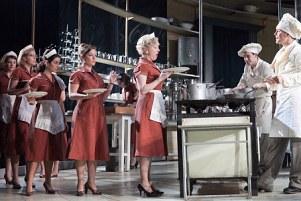The Kitchen
Like Arnold Wesker, the author of this play, I spent time in my youth as a waiter and kitchen assistant in a busy restaurant that, at lunchtime, served hundreds of meals. There was hardly time to breath as orders flooded in and I can still remember vividly the exhaustion which followed service. And this is shown pretty clearly in this behind-the-scenes insight into working life in a large, frantically busy restaurant.
'The Kitchen' is based on a restaurant in Paris where Mr Wesker worked, and is set in the mid 1950s. It begins with the arrival of the staff. Chefs, cooks, kitchen porters and waitresses dawdle or rush their their way into the kitchen to prepare for the day's onslaught in 'The Tivoli' which handles over a thousand lunches every day. As the staff arrive - all 30 of them - we begin to see the friendships, the rivalries and the connections between the characters. The head chef seems almost completely devoid of managerial responsibility, even when things go wrong, for example when there are complaints about the soup being sour. The only time he seems concerned is when one of the cooks gives a tramp some cutlets instead a dirty bowlful of sour soup.
The main character, though, is not the Head Chef, or even the proprietor as you might expect, but Peter, the boiled fish cook. Rivetingly played by Tom Brooke, Peter is German but only speaks with a slight German accent. He's in love with one of the waitresses who is already married and will not leave her husband. With angular jaw, a near skeletal frame and remarkably wide eyes, Peter is an odd, but enormously endearing personality. He wants more than just work and money, but when he invites the others to share their dreams in the lull between lunchtime and evening service, he is unable to describe his own dream out loud.
Everything about Bijan Sheibani's production is incredibly detailed and rigidly plotted. The staff are meticulously orchestrated which is no mean exercise given the size of the cast. When the focus needs to be on a small number of characters, the remainder of the staff freeze in their positions and then everyone starts reacting again when the story moves on. And when the lunchtime service gets into gear, the staff start a balletic sequence conducted by the proprietor.
Giles Cadle's hugely impressive set seems a shade too modern and rather too clean and neat. Otherwise, it is brilliantly crafted. What appear to be real gas flames blaze from the hobs, and though we never see any real ingredients - other than what looks like olive oil - when the cooks pretend to lay food in frying pans we hear sizzling and steam and smoke rise from the pans. Orders appear magically above the stage as they are delivered by the waitresses, and at one point when the pace is at it's most frantic, waitresses appear dangling from the ceiling on wires.
This is a compelling and absorbing play about repetitive and stressful work, unfulfilled dreams and the need to find something meaningful in life. The restaurant owner, Marango, assumes that paying good wages and giving staff food, he is providing them with all they need. "What is there more?" he asks the staff at the end of the play. It's a question directed at the audience as much as the staff. I suspect many of us could give quite a catalogue of other things we would like to do in life apart from the dismal, humdrum work of the type described here. Certainly 'The Kitchen' makes us consider what work should be like, but I wonder whether, in choreographing the kitchen activities, Bijan Sheibani softens the impact of what Wesker is telling us. Nonetheless, this is a fascinating production and definitely worth seeing.
(Peter Brown)
"A compelling insight into what it is like to work in such a highly pressurised environment, and Sheibani's staging brilliantly breaks the bonds of what seems, on the page, to be a largely naturalistic drama. "
Charles Spencer for The Daily Telegraph
"Brilliant Revival."
Michael Coveney for The Independent
"Wesker's enormous line-up of characters leaves us feeling oddly under-nourished ."
Fiona Mountford for The Evening Standard
"Even if Wesker's play is slightly softened, individual characters are sharply defined."
Michael Billington for The Guardian
External links to full reviews from popular press
Daily Telegraph - The Guardian - The Independent -
Originally published on
